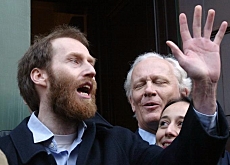NGO claims victory in ransom lawsuit

A Swiss court has rejected a lawsuit by the Dutch government seeking to recover ransom money paid to release an employee of a Swiss aid agency in Russia.
The Dutch authorities brought the unusual case against Médecins Sans Frontières Switzerland, after €1 million (SFr1.6 million) was handed over to free Arjan Erkel, a Dutch national kidnapped in the Caucasus in August 2002.
In a statement on Thursday, the medical aid group – also known as Doctors Without Borders – said the court in canton Geneva had ruled against the Netherlands and ordered the Dutch to pay the NGO €46,000 plus legal costs.
“This was the first time a democratically elected government has sued an international humanitarian organisation to recover money used to pay a ransom,” said Médecins Sans Frontières (MSF) spokesman Aymeric Peguillan.
“We find it problematic that a government – especially a government which claims to support humanitarian action – would go to court with an NGO,” he added.
The Dutch government had sought to recover €777,000 paid to free Erkel from unknown gunmen in the volatile Russian republic of Dagestan. Erkel was finally released in April 2004.
MSF, which had hung a gigantic photo of Erkel outside its central Geneva headquarters during his captivity, denies having entered into an agreement with Dutch authorities on repaying the ransom money.
The NGO has always refuted having paid ransoms to release kidnapped staff out of principle, so that its workers are not seen as “walking bank safes”.
It also countersued for €230,000 it put up to free Erkel, a request that was turned down by the court. But despite this outcome, MSF management was satisfied.
“This is a great relief,” said Christian Captier, head of MSF Switzerland after the verdict. “It reinforces our credibility with donors and people in the field.”
Advanced funds
Luc Hafner, the Dutch government’s lawyer, said the Netherlands had “advanced” the money at the request of MSF with the understanding that it would be repaid, but the humanitarian group did not return the funds.
“The decision is wrong in law. Swiss principles were not applied properly,” he explained. “The decision is very detrimental to NGOs because it will stop all possible collaboration with them,” he said, stressing the Dutch authorities plan to appeal.
A spokesman for the Dutch foreign ministry, Ahmed Dadou, said: “We are principally against negotiating with kidnappers. What we tried to do is to help MSF out, purely financially, and we assumed we would get our money back later on.”
The Netherlands’ embassy in Moscow paid a total of €1 million, including the €230,000 of the aid agency’s money, to a group of former Russian intelligence agents who brokered Erkel’s release, he said.
In a separate statement, the Dutch foreign ministry said that it would consider “the consequences this judgment could have on providing services and mediating in similar situations in the future” before making an appeal.
During the trial MSF had received political backing from various sides. The former French prime minister, Michel Rocard, said a ruling for the Dutch government would have been “an extremely serious blow for the principle of NGO missions”.
A letter by European parliamentarians to the Dutch foreign minister also argued that “it would have been much better to have resolved the affair amiably” and that “this type of trial endangered NGO activities”.
swissinfo with agencies
Arjan Erkel, head of MSF’s mission in Dagestan, was kidnapped on August 12, 2002.
He spent 607 days in captivity before being freed on April 11, 2004.
Arjan Erkel was taken hostage in Makhachkala, capital of the autonomous Russian republic, in 2002.
MSF is an international humanitarian organisation, offering medical services worldwide for the victims of natural disasters and war.
The parent organisation was founded in 1971 in reaction to the Biafra crisis in Nigeria. Bureaucracy and government meddling had hindered humanitarian aid to the region.
MSF considers itself to be independent and apolitical.
Its members also consider it their duty to report abuses they witness.
MSF Switzerland was founded in 1981.
MSF operates in 72 countries, the Swiss section in 20.
In 1999, the organisation was awarded the Nobel Peace Prize.

In compliance with the JTI standards
More: SWI swissinfo.ch certified by the Journalism Trust Initiative










You can find an overview of ongoing debates with our journalists here . Please join us!
If you want to start a conversation about a topic raised in this article or want to report factual errors, email us at english@swissinfo.ch.